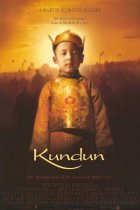
Kundun Page #10
- PG-13
- Year:
- 1997
- 134 min
- 1,147 Views
It is a frightening sight.
EXT. GARDEN, NORBULINKA DAWN (1950)
The still waters of the fish pond begin to move. The fish
swim in nervous circles; the water laps over its stone
banks.
EXT. DALAI LAMA'S RESIDENCE DAWN
The whole building shakes. Earthquake.
One monk runs down the stairs, another monk runs up, both
staring at a second floor window - a black-rimmed, glass
window.
A red cloth is pulled back and the window is opened.
The fifteen year-old Tenzin Gyatso looks out.
There is a terrible rumbling: the rumbling that accompanies
an earthquake. Finally, slowly, the sound, and the movement
subsides.
CLOSE on Tenzin Gyatso. He lets the curtain fall.
INT. GREAT HALL, THE POTALA DAY
The General Assembly is in session.
Once again, the Yigstang and the Tsitang - four monks and
four laymen - sit facing one another. But the room is
crowded today - this is a full session. The Lord
chamberlain sits in. Regent Taktra is there.
The senior Layman is on his knees.
LAYMAN:
China.
In the back of the room we notice an open door.
INT. HALLWAY DAY
The Dalai Lama is listening. He stands taller than the
first time we caught him eavesdropping. He still is not a
part of this assembly, but he doesn't seem to care if he is
spotted.
The Layman continues.
LAYMAN:
Now, as his great army, stands idle
on our borders, Chairman Mao has
presented Tibet with three demands:
it is part of China.
A murmuring in the room.
INT. HALLWAY DAY
Shock on the face of His Holiness.
LAYMAN (OC)
Two, Tibet's defenses must
be handled by China.
Three, all political and trade
matters concerning foreign countries
must be conducted through China.
Give the Dalai Lama his majority!
The senior Monk is on his knees.
MONK:
We can concede that Tibet is a part
of China if we can guarantee that
the Dalai Lama's name and authority
will remain...
LAYMAN:
And do you believe that the Tibetan
government will be allowed to
continue to function as it is?
Do you believe that our religion
will be protected?
VOICES:
Give the Dalai Lama his majority!
MONK:
We have dealt with this Chinese
obsession for hundreds of years.
We can deal with it now.
LAYMAN:
These are not the Chinese we know.
These are Communists.
VOICES:
Make him Dalai Lama now!
We see the Lord Chamberlain look toward the open door.
INT. HALLWAY DAY
Tenzin Gyatso looks at his advisor, and then, he closes the
door as the demand for his enthronement continues.
He walks down the hall, past the door leading to the
treasure room, alone now - an adult. He is wearing those
European, lace-up shoes found in the treasure room so long
ago. They are still too big for him.
EXT. TRIBUTARY OF THE KYICHU RIVER, NORBULINKA DAY
Tenzin Gyatso and Taktra Rinpoche walk side by side along
the waterway.
TENZIN GYATSO:
If we agree that we are part of
China, nothing else will matter.
Not trade, not defense. We will be
lost.
TAKTRA RINPOCHE:
What would you do, Holiness?
The boy looks out over the water.
Shepherds are leading their flock of sheep back toward town
on the far side of the tributary.
The two men stand side by side, one so young, one seeming so
old.
TENZIN GYATSO:
What should I do about my doubt,
Teacher?
TAKTRA RINPOCHE:
It is a difficult situation.
TENZIN GYATSO:
I mean, my doubt. Why me?
Am I Him?
TAKTRA RINPOCHE:
Doubt is an affliction. Reliquish
it. Accept.
Pause.
TENZIN GYATSO:
I believe we must make no concesions
to the Chinese. But, I am one voice.
The Dalai Lama has always trusted in
the forces of Buddha. Let us consult
the protective deities.
Taktra Rinpoche bows and leaves him.
Tenzin Gyatso stands alone by the river. The boy watches
the herders, and before the young shepherds disappear from
sight, the Dalai Lama turns and waves a hand behind him.
Two Bodyguards approach. We can not hear, but as the Dalai
Lama walks away from us, down the river, one Bodyguard runs
up river, shouting:
BODYGUARD (shouting)
We will buy them! We will buy them!
INT. ALTAR ROOM, NORBULINKA DAY
In this black room, under the protective view of the statue
of Mahakala, a divine lottery is performed.
Tenzin Gyatso, the Regent Taktra Rinpoche, The Lord
chamberlain, the Kashag, the Yigstang and the Tsitang are
all present.
Tsampa-dough balls are made, three of them, each containing
a strip of parchment, bearing writing. The dough is shaped
and weighed to see that each ball is equal.
Then, the three balls are placed in a silver bowl and the
bowl is spun. The balls whirl, race, and finally one leaps
from the bowl.
This ball is taken to the Dalai Lama and he makes a mark on
it. The ball is returned to the bowl, the procedure is
repeated, and a ball leaps again, almost immediately. This
ball is presented and the Dalai Lama places his mark - next
to the mark he just made. It is the same ball.
Tenzin Gyatso makes the twelfth mark on the same ball, and
the spinning begins again and then the thirteenth mark, and
then the ball is broken open and the strip of parchment
handed to the Regent.
TAKTRA RINPOCHE:
We should not accept any conditions
from the Chinese.
EXT. GARDENS, NORBULINKA DAY
In a paved area, adjacent to the Yellow Wall which marks the
Dalai Lama's private grounds, the Opera Festival has begun.
This festival involves performances by Tibetan singers,
dancers and actors. It looks to be a joyous occasion;
officials and their wives are dressed in their finest and
sit before beautifully laid picnics. Children run here and
there, amidst the monks and nomads, the swashbuckling
Khambas from eastern Tibet (large people, with heavy braids
wrapped in red cloth on top of their heads). There are
westerners, Nepalese and Sikimese.
Dancers - dressed in wild, colorful outfits - spin and leap
in time to the eerie, Tibetan music.
Atop a low building on the Yellow Wall, stands an elaborate
enclosure - draped in yellow silk.
The Dalai Lama sits inside it.
INT. ENCLOSURE DAY
Tenzin Gyatso is alone in this little room; his arms rest
on a window ledge as he stares down at the festival taking
place below him.
EXT. GARDENS DAY
A bit more of the dancers and the people enjoying themselves
- all from the isolated point of view of the Dalai Lama.
We recognize a few characters: Keustang Rinpoche. His
Holiness's Mother with her younger children, the favorite
sweeper, Norbu Thundrup - dressed in a fine hat.
But a distant figure becomes apparent - he is a MESSENGER -
he is running, through the crowds, toward the Yellow Wall.
We stay on this desperate little figure as he draws closer.
INT. ENCLOSURE DAY
The boy is watching the Messenger.
EXT. GARDENS DAY
Back to that messenger as he works his way, ever closer to
the building which holds the Dalai Lama aloft, and then we
lose sight of him.
INT. ENCLOSURE DAY
Tenzin Gyatso leans back in his seat. The yellow silk
Translation
Translate and read this script in other languages:
Select another language:
- - Select -
- 简体中文 (Chinese - Simplified)
- 繁體中文 (Chinese - Traditional)
- Español (Spanish)
- Esperanto (Esperanto)
- 日本語 (Japanese)
- Português (Portuguese)
- Deutsch (German)
- العربية (Arabic)
- Français (French)
- Русский (Russian)
- ಕನ್ನಡ (Kannada)
- 한국어 (Korean)
- עברית (Hebrew)
- Gaeilge (Irish)
- Українська (Ukrainian)
- اردو (Urdu)
- Magyar (Hungarian)
- मानक हिन्दी (Hindi)
- Indonesia (Indonesian)
- Italiano (Italian)
- தமிழ் (Tamil)
- Türkçe (Turkish)
- తెలుగు (Telugu)
- ภาษาไทย (Thai)
- Tiếng Việt (Vietnamese)
- Čeština (Czech)
- Polski (Polish)
- Bahasa Indonesia (Indonesian)
- Românește (Romanian)
- Nederlands (Dutch)
- Ελληνικά (Greek)
- Latinum (Latin)
- Svenska (Swedish)
- Dansk (Danish)
- Suomi (Finnish)
- فارسی (Persian)
- ייִדיש (Yiddish)
- հայերեն (Armenian)
- Norsk (Norwegian)
- English (English)
Citation
Use the citation below to add this screenplay to your bibliography:
Style:MLAChicagoAPA
"Kundun" Scripts.com. STANDS4 LLC, 2024. Web. 26 Dec. 2024. <https://www.scripts.com/script/kundun_890>.



Discuss this script with the community:
Report Comment
We're doing our best to make sure our content is useful, accurate and safe.
If by any chance you spot an inappropriate comment while navigating through our website please use this form to let us know, and we'll take care of it shortly.
Attachment
You need to be logged in to favorite.
Log In